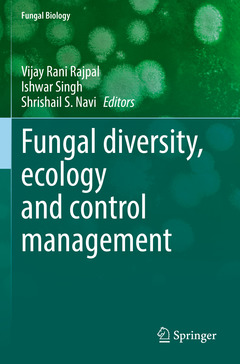Fungal diversity, ecology and control management, 1st ed. 2022 Fungal Biology Series

This edited volume provides comprehensive and latest information on the fungal biodiversity in its morphological characters, bioactive molecules, pathogenicity and virulence, and its impacts on crop production and sustainable management of agricultural productivity towards resolving global food security issues. The increasing number of infectious fungal diseases are regarded as threats to agricultural productivity and global food security. The efforts done by scientists to inventories the fungal diversity and identification of fungal species contributing as pathogens towards many plant and human diseases have been compiled in the present volume. The identification of the potential fungal pathogens is a prerequisite for an effective disease control management program. Also important is to understand the complex interactions between the host-pathogen and the environment. The book dwells on insights on the aforementioned aspects. The book also includes articles on ecological significance of fungi and fungal antagonists used as biocontrol agents on other pathogens. This compilation is useful to scientists working in similar areas as well as to undergraduate and graduate students keen on getting updated information on the subject. Scientists involved in agricultural research, crop management, and industries that manufacture agrochemicals may also find it useful read.
Dr. Vijay Rani Rajpal is a professor in the Botany Department, Hansraj College, Delhi University, Delhi, India, and has approximately 25 years of research experience in working on population biology, phylogenetics, and diversity of plants. She has 45 published research papers, review articles, and book chapters and has edited 4 books on molecular diversity, abiotic stress mitigation, and improvement of plants published by Springer Switzerland. She has guided Ph.D. students and successfully completed a number of research projects funded by various agencies of the Government of India. She is a reviewer of several reputed national and international research journals and invited guest editor for a thematic issue of Frontiers in Genetics.
Dr. Ishwar Singh, a trained mycologist, has been researching in the field of microbiology with special focus on mycotoxins and characterization of phytopathogens and their biocontrol for the last 20 years. He was a visiting faculty in the Department of Plant Pathology and microbiology, Iowa State University of Science and Technology, Ames, Iowa, USA (2014–15, Raman Research Fellowship). He has also been a recipient of UGC Research Award (2013). Currently, he is working as an associate professor in the Department of Botany at Hansraj College, University of Delhi, Delhi, India. He has published 30 research papers and articles and successfully completed a number of research projects. He is a member of the editorial board of many journals.
Dr. Shrishail S. Navi works in the Department of Plant Pathology and Microbiology, and the Department of Entomology, Iowa State University (ISU), as research scientist III. His focus is on managing major soilborne pathogens of soybean, corn, field pea, and spinach. His research is supported by industry dollars (Avg. $88K/year). He has published books, bul
Provides a comprehensive account of fungal biodiversity
Explains how fungi are important to humans and the environment
Adds perspectives on management and control of various fungal pathogens
Date de parution : 06-2023
Ouvrage de 637 p.
15.5x23.5 cm
Date de parution : 06-2022
Ouvrage de 637 p.
15.5x23.5 cm



